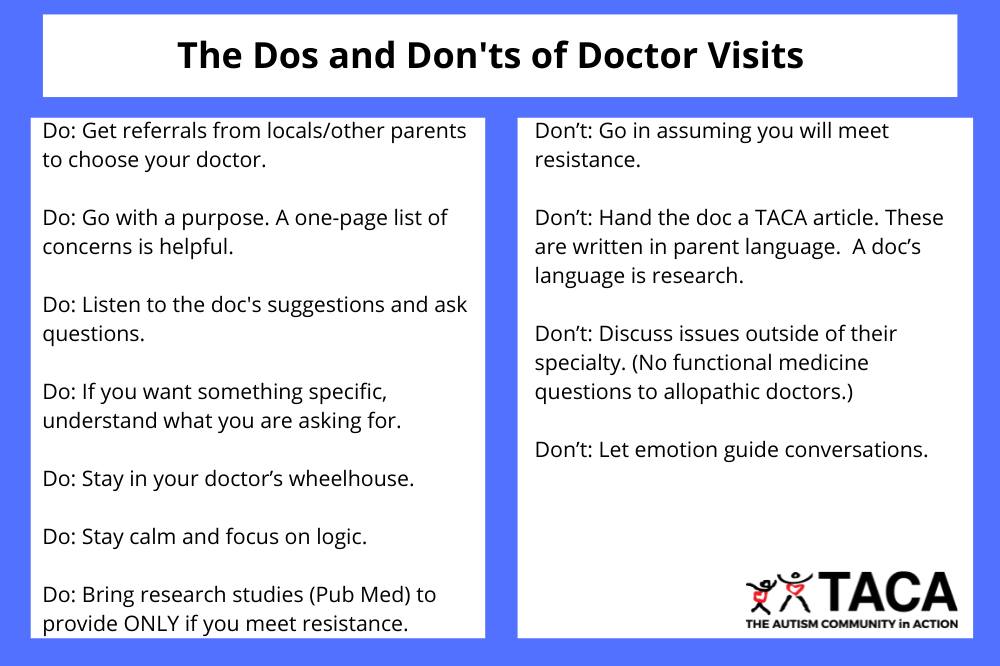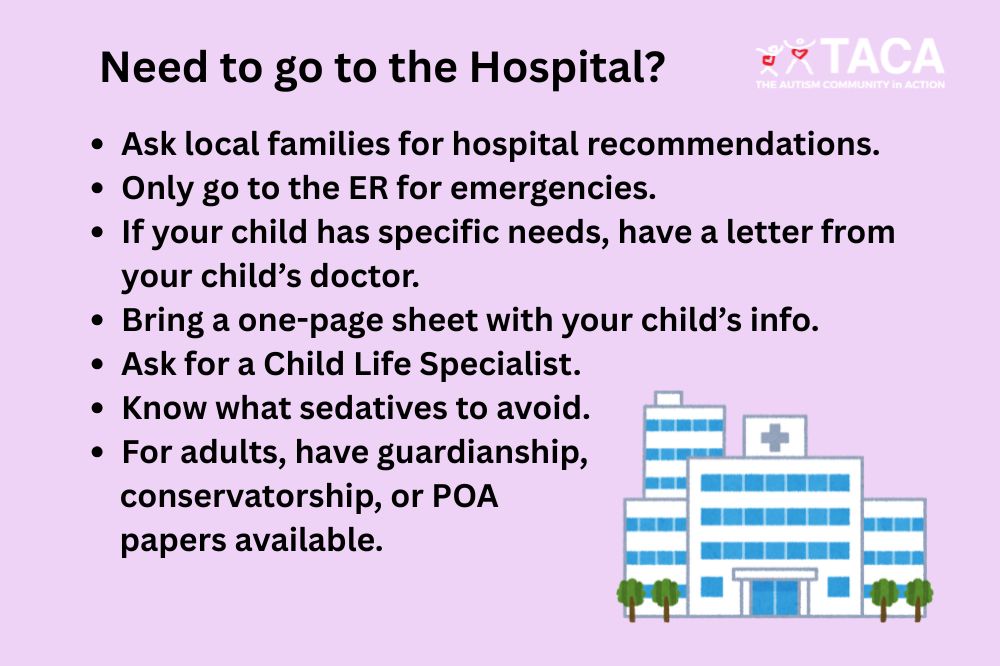Navigating Specialist and Hospital Visits with Autism

All contents of this resource were created for informational purposes only and are not intended to be a substitute for professional advice, diagnosis, or treatment. Always seek the advice of your physician, therapist, or other qualified health providers with any questions or concerns you may have.
Individuals diagnosed with autism need a pediatrician or primary care physician (PCP) and often require specialists such as GI doctors, Neurologists, Endocrinologists, Allergists, and more.
Unfortunately, the reality is that most specialists are not trained in how to treat underlying medical issues in individuals diagnosed with autism. Therefore, parents and guardians need to be prepared when attending appointments.
Additionally, youth and adults with autism spectrum disorder are more likely to visit the hospital than their neurotypical peers due to their co-occurring medical issues.
This article will cover:

If your child needs to see a medical specialist:
Ask locally for recommendations for open-minded specialists
This can make all the difference
Focus on the medical issue, not the autism
Do not ask the specialist about autism symptoms.
Ask about specific symptoms that the specialist treats.
- For example:
- Ask a GI doctor about constipation, not poor behavior.
- Ask the neurologist about symptoms of seizures, not meltdowns.
Bring a one-page sheet with your child’s information
Bring 2 copies of a one-page sheet with your child’s:
- Name and date of birth
- Health Insurance information
- Diagnoses
- Medicines and general supplements with doses
- Symptoms requiring the visit
Give one to the nurse/doctor and keep one for yourself to guide the conversation
Bring notes and take notes!
- Make notes for yourself on what you would like to address in the appointment.
- These should include possible testing and treatment options
- Take notes during the appointment
- Notes help you stay on topic
- After the appointment, write out a list of action items in your notes
Advocate by bringing supporting documents
- Recent research on treatments you want to discuss
- Past lab work
- List of symptoms
Stay in your doctor’s wheelhouse
- Don’t ask about things outside their specialty.
- For example:
- Do not ask a GI doctor about fungal overgrowth in the gut. This question is for a functional medicine doctor.
- Don’t ask a GI doctor about food sensitivities, but you CAN ask them about testing for celiac disease, Eosinophilic esophagitis, and more.
- Do not ask the pediatrician about functional medicine tests.
- Learn about the difference between regular lab testing and functional lab testing in this article called “Lab Testing for Common Co-Occurring Medical Issues in Autism”
- Learn about Types of Specialists and what they do in this free TACA Download:
- Learn the difference between an allopathic medical professional and functional medicine provider.
- TACA’s “Finding a Doctor” article helps explain the difference.
Be prepared
- Know why you are there
- Know what you are asking for
- Know why you are asking for it
Stick to what is necessary and relevant
- Don’t try to resolve all issues in one appointment
If the specialist is not helpful or you do not agree with their suggestions
Try to find common ground
- You both have your child’s best interests at heart.
Come to a compromise
- Perhaps agree to read the research and think about their suggestions.
Ask for links to research on what the doctor is suggesting
- Collect it to read and discuss later.
Change doctors to someone you have researched and feel is a better fit
- Talk to local like-minded autism parents for suggestions.
- Find an open-minded doctor who is willing to read and learn.
Know when a doctor can no longer help you
- For example, developmental pediatricians can often help with referrals to therapy and getting a diagnosis, but know little about the underlying medical issues causing the symptoms you are seeing.
Always be respectful
- No matter how you feel about the doctor’s recommendations, they are there to help your child and that deserves respect.

When hospitalization is needed
There will be times when hospitalization is needed due to a procedure or surgery. Or perhaps your child has an emergency medical situation. In these cases, consider these options.
Ask local families which hospital is best for treating special needs patients
- Ask in local Facebook groups.
- Ask your child’s primary care provider which local hospitals are best for special needs individuals.
Remember that the emergency room is only equipped to handle emergency situations
- Do not take your child to the ER for non-emergency situations. In those cases, the pediatrician or urgent care should be helpful. In fact, they are more likely to run needed testing.
Be prepared with a letter from your child’s doctor detailing any specific needs
If your child has specific needs, have your child’s doctor prepare a letter. For example:
- If your child has mitochondrial dysfunction and requires a specific mitochondrial protocol when being sedated.
- If your child has specific drug or food allergies.
Scan the letter into your phone so you have it in case of emergency.
Bring a one-page sheet with your child’s information
- Name and date of birth
- Health insurance information
- Diagnoses
- Medicines and general supplements with doses
- Past reactions to anesthesia or medications
- You can have this stored as a PDF in your phone
Ask for a Child Life Specialist
- They help children and families cope with the stress and anxiety that often accompany a hospital experience.
Know what sedatives should be avoided
- Know how to sedate safely by reviewing this article called “Anesthesia and the Autistic Child”.
- If sedation is needed, ask the anestheologist what sedatives will be used.
If your child is a legal adult, have paperwork ready
- Make sure you have their guardianship, conservatorship, medical care directive or Power of Attorney.
- Either store it in your phone so it is accessible, or bring a physical copy.
If you are having trouble with hospital decisions or staff
Ask for a second opinion
- It’s okay to ask.
Ask for a copy of the hospital’s Patient Bill of Rights
- Here is the Federal Patient Bill of Rights and Responsibilities
Connect with a patient advocate
- All hospitals should have patient advocates.
- Patient advocates work to ensure patients receive appropriate care and treatment, help to resolve issues and grievances, and act as a liaison between patients, families, and the hospital.
Coordinate with the hospital’s social worker
- They can be assigned to your case at any time to help advocate for your needs.
- Social Workers work to address emotional distress, coordinating care, and connecting patients and families with needed resources.
Conclusion
Individuals diagnosed with autism will likely need specialist care or hospitalization in their lifetime. Being prepared and knowing your rights can help ease the process.




